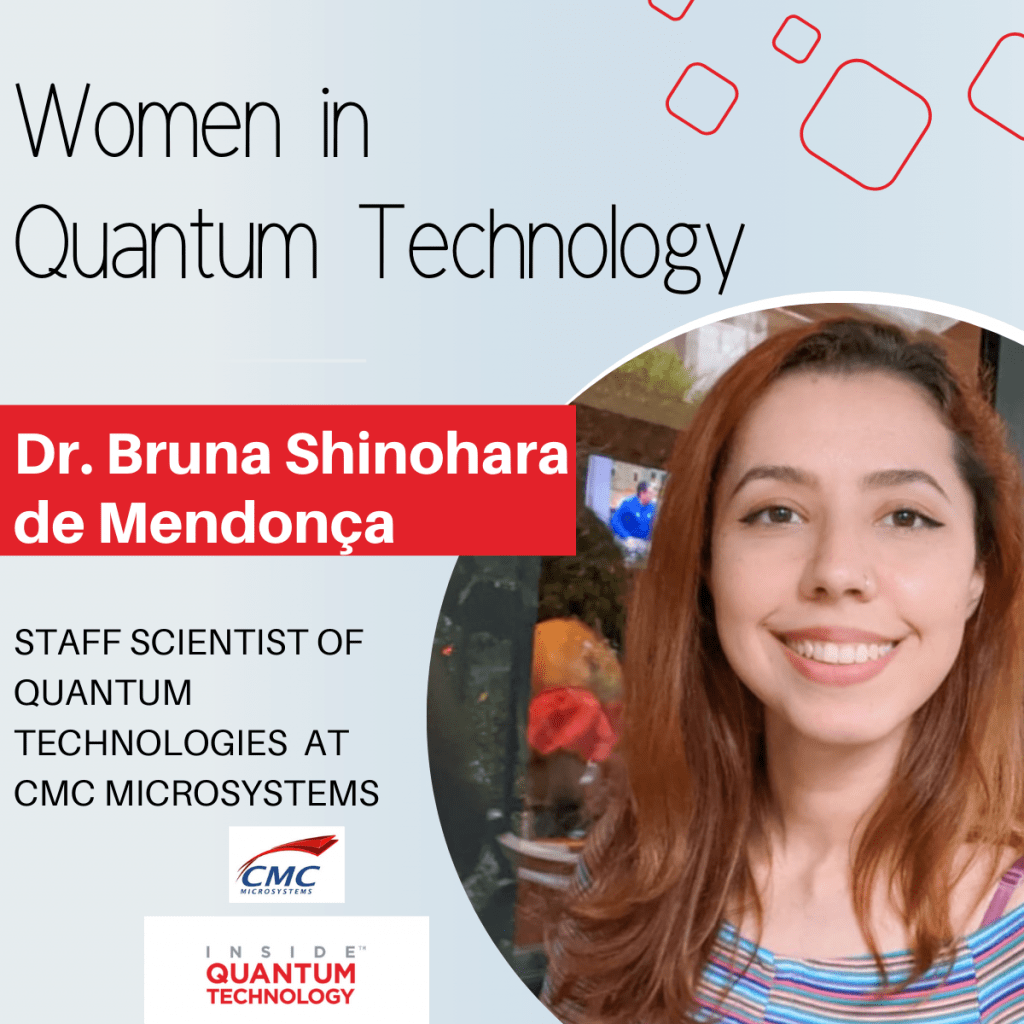Thanks to the expanding quantum ecosystem, there seem to be unending stories of individuals finding successful careers within the quantum industry. One of these individuals is Dr. Bruna Shinohara de Mendonça, a staff scientist of quantum technologies at CMC Microsystems in Canada. “It’s a great position for me because it aligns with my interests,” Shinohara de Mendonça told Inside Quantum Technology. “I study and implement quantum algorithms for both industrial and academic partners. I’m also involved in developing training activities aimed at helping companies gain a deeper understanding of how quantum technologies can benefit their businesses. Additionally, I work alongside the outreach team from time to time to raise awareness of quantum technologies in Canada.”
Before landing her position at CMC Microsystems, Shinohara de Mendonça was drawn to quantum science during her undergraduate degree. “It all began with my first course in modern physics,” she elaborated. “Classical physics was intuitive and somewhat predictable, but modern physics opened a new world. As I continued with more advanced courses, my interest only grew. At some point, I learned about quantum computers, which grabbed my attention. I decided to focus on this subject during my PhD because there is still much to be understood and developed in this field. It felt like a unique opportunity to be part of an exciting emerging technology.” Shinohara de Mendonça decided to attend the University of Sao Paulo in Brazil for her Ph.D. career, focusing on theoretical and mathematical physics.
During her graduate studies, Shinohara de Mendonça had a significant realization about her career. “Around the second year of my PhD, I realized that I didn’t really want to pursue an academic career,” Shinohara de Mendonça stated. “I never enjoyed teaching. Moreover, I began to develop an interest in science outreach and quantum software. Both interests went beyond the scope of my PhD, and it was clear that they were seen as hindrances. In academia, most people benefit from maintaining laser-sharp focus, but I have always been someone with a wide range of interests.”
After realizing this, Shinohara de Mendonça understood that she had to change how she presented herself as a job applicant. She explained, “When I decided to pursue a career in industry, I focused on developing a resume that would highlight my interests beyond academic research. I created public science outreach materials and content on quantum algorithms. I applied for quantum computing jobs and faced numerous rejections, but I kept improving. Both my resume and interview skills significantly improved, and eventually, the ‘yes’ finally came!” That yes came as a position at CMC Microsystems, where Shinohara de Mendonça was hired in 2023.
As Shinohara de Mendonça is passionate about leadership within her company, she has seen firsthand the importance of making the quantum industry more inclusive towards underrepresented groups. “I hold great hopes for diversity progress in the quantum industry,” Shinohara de Mendonça added. “Since it’s a relatively new field, it’s more receptive to shedding old-fashioned ideas. In comparison to academia, I feel much more welcome here.” Yet, Shinohara de Mendonça has still found that many improvements need to be made. “In my experience, most of the challenges stem from individuals not directly involved in quantum science or technology. Physics, in general, often places itself in an ivory tower and remains distant from the public. The enigmatic nature of quantum physics, combined with the prevailing notion that physics is the domain of ‘geniuses,’ predominantly male, poses the greatest difficulty for me as a woman trying to engage with the public. Nevertheless, I firmly believe that these efforts are crucial.”
Shinohara de Mendonça also highlighted the importance of having discussions of inclusivity focusing on the geopolitical landscape. “Beyond gender, as a Brazilian, I also believe that efforts should be made to think of quantum technology globally,” Shinohara de Mendonça said. “There are pivotal aspects of this industry that would greatly benefit from open dialogues among countries. For instance, extraction of materials for quantum hardware materials, such as semiconductors and rare earth elements, may disproportionately impact some regions.”
Kenna Hughes-Castleberry is a staff writer at Inside Quantum Technology and the Science Communicator at JILA (a partnership between the University of Colorado Boulder and NIST). Her writing beats include deep tech, quantum computing, and AI. Her work has been featured in Scientific American, Discover Magazine, New Scientist, Ars Technica, and more.
